莎士比亚十四行诗
- 格式:doc
- 大小:51.00 KB
- 文档页数:12

1From fairest creatures we desire increase;That thereby beauty’s rose might never die;But as the riper should by time deceaseHis tender heir might bear his memory.But thou; contracted to thine own bright eyes;Feed’st thy light’s flame with self-substantial fuel; Making a famine where abundance lies;Thyself thy foe; to thy sweet self too cruel.Thou that art now the world’s fresh ornamentAnd only herald to the gaudy spring;Within thine own bud buriest thy content;And; t ender churl; mak’st waste in niggarding.Pity the world; or else this glutton be;To eat the world’s due; by the grave and thee.惟愿佳丽多成行;美丽玫瑰不断秧;前辈寿终需正寝;娇嫩儿女继芬芳..俊杰自恋太荒唐;迟迟不肯迎新娘..富贵不思成家业;人人为君而悲伤..百花丛中最鲜艳;君乃伦敦第一郎;天下女儿都思君;俊杰为何不大婚别让花芯空枯萎;开花结果理应当;如把青春空挥霍;死后带入坟墓中2When forty winters shall besiege thy browAnd dig deep trenches in thy beauty’s field;Thy youth’s proud livery; so gazed on now;Will be a tattered weed; of small worth held. Then being asked where all thy beauty lies;Where all the treasure of thy lusty days;To say within thine own deep-sunken eyesWere an all-eating shame and thriftless praise. How much more praise deserved thy beauty’s useIf thou couldst answer; “This fair child of mine Shall sum my count and make my old excuse;”Proving his beauty by succession thine.This were to be new made when thou art old;And see thy blood warm when thou feel’st it cold.2四十严冬攻额头;脸上皱纹如鸿沟;青春华服人人颂;老来变成烂布头..如是有人问起你;当年青春在哪里“在我深陷眼窝里;”如此回答真可耻..“当年美貌传子孙;儿女养老又送终..”青春如此来使用;世上无人不称颂..不怕年老手足僵;儿女成长继芬芳..3Look in thy glass and tell the face thou viewest; Now is the time that face should form another; Whose fresh repair if now thou not renewest;Thou dost beguile the world; unbless some mother. For where is she so fair whose uneared womb Disdains the tillage of thy husbandryOr who is he so fond will be the tombOf his self-love; to stop posterityThou art thy mother’s glass; and she in thee Calls back the lovely April of her prime;So thou through windows of thine age shalt see; Despite of wrinkles; this thy golden time.But if thou live remembered not to be;Die single and thine image dies with thee.3快去照镜子;告诉镜中人;时刻已到来;再造镜中人..英俊男青年;如不成大婚;世界将悲哀;减少一母亲..多少美少女;渴望你爱情;盼你来播种;盼你来耕耘 ..纯洁男青年;不要再分心;为何太自恋;断子又绝孙你就是镜子;对于你母亲;母亲的青春;在你身影里;将来你衰老;你也将看到;自己的青春;儿女身影里..如果你不愿;留下美孩儿;老来无人问;美貌葬孤坟 ..4Unthrifty loveliness; why dost thou spendUpon thyself thy beauty’s legacyNature’s bequest gives nothing; but doth lend; And; being frank; she lends to those are free. Then; beauteous niggard; why dost thou abuseThe bounteous largess given thee to give Profitless usurer; why dost thou useSo great a sum of sums yet canst not liveFor having traffic with thyself alone;Thou of thyself thy sweet self dost deceive.Then how when nature calls thee to be gone;What acceptable audit canst thou leaveThy unused beauty must be tombed with thee; Which usèd lives th' executor to be.4风流倜傥美青年;不要整天来游玩;天生丽质天赐你;让她流传到永远..青年朋友别犹豫;坚持独身有何益;别做愚蠢守财奴;腰缠万贯饿肚皮..青年迟迟不大婚;祖宗香火谁继承..何不养育美孩儿;多子多福过一生..青年若听我忠言;不怕死神来敲门;否则将来上西天;风流文采无处寻..5Those hours that with gentle work did frameThe lovely gaze where every eye doth dwellWill play the tyrants to the very sameAnd that unfair which fairly doth excel.For never-resting time leads summer onTo hideous winter and confounds him there;Sap checked with frost and lusty leaves quite gone;Beauty o'er-snowed and bareness everywhere.Then were not summer’s distillation left;A liquid prisoner pent in walls of glass;Beauty’s effect with beauty were bereft;Nor it nor no remembrance what it was.But flowers distilled; though they with winter meet;Lose but their show; their substance still lives sweet. 时间铸造美容颜;贩夫走卒齐惊叹;将来还要施暴戾;使你丑陋人人嫌..无情时间将夏天;拖到冬天来摧残;树脂结冰枝叶枯;美丽埋葬在荒原..如不及时把玫瑰;炼成香水藏瓶内;将来花儿枯萎时;一缕清香无处寻..提炼的花儿得永生;永留芬芳在人间..6Then let not winter’s ragged hand defaceIn thee thy summer; ere thou be distilled.Make sweet some vial; treasure thou some placeWith beauty’s treasure; ere it be self-killed.That use is not forbidden usuryWhich happies those that pay the willing loan;That’s for thyself to breed another thee;Or ten times happier; be it ten for one.Ten times thyself were happier than thou art;If ten of thine ten times refigured thee.Then what could death do if thou shouldst depart; Leaving thee living in posterityBe not self-willed; for thou art much too fairTo be death’s conquest and make worms thine heir. 6别让冬天佝偻手;夺走你的娇丽颜;人生精华需珍惜;生儿育女莫迟疑 ..这不是放高利贷;还钱的人多愉快;是要你再生一个你;生得越多越痛快..生出十个都像你;你的幸福增十倍;活在后代身影里;死神拿你也无奈..好朋友;别拖延;不要让蛆虫;做你继承人..7Lo; in the Orient when the gracious lightLifts up his burning head; each under eyeDoth homage to his new-appearing sight;Serving with looks his sacred majesty;And having climbed the steep-up heavenly hill; Resembling strong youth in his middle age;Yet mortal looks adore his beauty still;Attending on his golden pilgrimage.But when from highmost pitch; with weary car;Like feeble age he reeleth from the day;The eyes; 'fore duteous; now converted areFrom his low tract and look another way.So thou; thyself out-going in thy noon;Unlooked on diest unless thou get a son.红日冉冉升蓝天;光芒万道照人寰;如同天使来人间;凡夫俗子尽开颜..太阳继续升上天;如同健儿正青春;世人尤赞其美貌;万众瞩目伴旅程 ..一旦越过天峰顶;疲态毕露车马昏;凡人转眼望它处;左顾右盼若失魂..风流倜傥美青年;成家立业理当然;如无子孙留人间;晚年孤独好辛酸..8Music to hear; why hear’st thou music sadlySweets with sweets war not; joy delights in joy.Why lov’st thou that which thou receiv’st not gladly; Or else receiv’st with pleasure thine annoyIf the true concord of well-tuned sounds;By unions married; do offend thine ear;They do but sweetly chide thee; who confoundsIn singleness the parts that thou shouldst bear.Mark how one string; sweet husband to another; Strikes each in each by mutual ordering; Resembling sire and child and happy mother;Who all in one; one pleasing note do sing;Whose speechless song; being many; seeming one; Sings this to thee: “Thou single wilt prove none.”天籁之声绕耳畔;俊杰为何要悲伤自寻烦恼有何益;不要辜负好时光..如果动人鲁提琴;打扰你的好心情;她们正在责备你;为何没有小家庭..请听群弦齐奋响;仙乐飘飘处处闻;如同娇妻和孩儿;莺声燕语规劝您;音乐虽然无词语;异曲同工意思同;如无儿女留人间;老来孤独又心酸..9Is it for fear to wet a widow’s eyeThat thou consum’st thyself in single lifeAh; if thou issueless shalt hap to die;The world will wail thee like a makeless wife;The world will be thy widow and still weep;That thou no form of thee hast left behind;When every private widow well may keep;By children’s eyes; her husband’s shape in mind. Look what an unthrift in the world doth spend Shifts but his place; for still the world enjoys it; But beauty’s w aste hath in the world an end;And kept unused; the user so destroys it.No love toward others in that bosom sitsThat on himself such murd'rous shame commits.担心寡妇会哭泣;独身主义过一生;你如死去无孩儿;世界将为你哭泣..世界将成你寡妇;美人一去无踪影..留得儿女在人间;美貌才能永相传..浪子虽然挥霍钱;金钱仍然在人间..青春一去无踪影;不用也会消耗完..如把青春空挥霍;死后带入坟墓中..10For shame deny that thou bear’st love to any; Who for thyself art so unprovident.Grant if thou wilt; thou art belov’d of many;But that thou none lov’st is most evident;For thou art so possessed with murd'rous hateThat ‘gainst thyself thou stick’st not to conspire; Seeking that beauteous roof to ruinateWhich to repair should be thy chief desire.O change thy thought; that I may change my mind. Shall hate be fairer lodged than gentle loveBe as thy presence is; gracious and kind;Or to thyself at least kind-hearted prove.Make thee another self for love of me;That beauty still may live in thine or thee.别说你还有爱心;对自己也不关心;虽然人人喜欢你;你却不爱任何人..撒旦占据你心灵;你想孤独过一生;迟迟不愿成家业;人人为君而担心..风流倜傥美青年;请听愚兄一忠言;青春一去不复还;两人世界比蜜甜..早日娶回美贤妻;生活幸福又温馨..为爱我再生一个你;风流文采永相传..。

莎士比亚最经典的九首十四行诗,一生至少要读一次!威廉·莎士比亚,是英国文学史上最杰出的戏剧家,也是欧洲文艺复兴时期最重要、最伟大的作家,全世界最卓越的文学家之一。
莎士比亚流传下来的作品包括39部戏剧、154首十四行诗、两首长叙事诗。
今天就来欣赏下莎士比亚的十四行诗!1. 宁可卑劣宁可卑劣,也不愿负卑劣的虚名,当我们的清白蒙上不白之冤,当正当的娱乐被人妄加恶声,不体察我们的感情,只凭偏见。
为什么别人虚伪淫猥的眼睛有权赞扬或诋毁我活跃的血?专侦伺我的弱点而比我坏的人为什么把我认为善的恣意污蔑?我就是我,他们对于我的诋毁只能够宣扬他们自己的卑鄙:我本方正,他们的视线自不轨;这种坏心眼怎么配把我非议?除非他们固执这糊涂的邪说:恶是人性,统治着世间的是恶。
2. 爱是亘古长明的灯塔我绝不承认两颗真心的结合,会有任何障碍;爱算不得真爱,若是一看见人家改变便转舵,或者一看见人家转弯便离开。
哦,绝不!爱是亘古长明的灯塔,它定睛望着风暴却兀不为动;爱又是指引迷舟的一颗恒星,你可量它多高,它所值却无穷。
爱不受时光的播弄,尽管红颜和皓齿难免遭受时光的毒手;爱并不因瞬息的改变而改变,它巍然矗立直到末日的尽头。
我这话若说错,并被证明不确,就算我没写诗,也没人真爱过。
3. 我怎么能够把你来比作夏天怎么能够把你来比作夏天?你不独比它可爱也比它温婉狂风把五月宠爱的嫩蕊作践,夏天出凭的期限由未免太短天上的眼睛有时照得太酷烈它那炳耀的金颜又常遭掩蔽被机缘或无常的天道所摧折,没有芳艳不终于凋残或销毁但是你的长夏永远不会凋落也不会损失你这皎洁的红芳或死神夸口你在他的影里漂泊当你在不朽的诗里与时同长只要有人类,或人有眼睛,这诗将长存,并赐给你生命。
4. 你的爱怜抹掉那世俗的讥谗你的爱怜抹掉那世俗的讥谗,打在我额上的耻辱的烙印;别人的毁誉对我有什么相干,你既表扬我的善又把恶遮隐!你是我整个宇宙,我必须努力从你的口里听取我的荣和辱;我把别人,别人把我,都当作死,谁能使我的铁心肠变善或变恶?别人的意见我全扔入了深渊,那么干净,我简直像聋蛇一般,凭他奉承或诽谤都充耳不闻。

莎士比亚经典十四行诗欣赏莎士比亚经典十四行诗:When thou shalt be disposed to set me light,And place my merit in the eye of scorn,Upon thy side against myself I'll fight,And prove thee virtuous, though thou art forsworn. With mine own weakness being best acquainted,Upon thy part I can set down a storyOf faults conceal'd, wherein I am attainted,That thou in losing me shalt win much glory:And I by this will be a gainer too;For bending all my loving thoughts on thee,The injuries that to myself I do,Doing thee vantage, double-vantage me.Such is my love, to thee I so belong,That for thy right myself will bear all wrong.当你有一天下决心瞧我不起,用侮蔑的眼光衡量我的轻重,我将站在你那边打击我自己,证明你贤德,尽管你已经背盟。
对自己的弱点我既那么内行,我将为你的利益捏造我种种无人觉察的过失,把自己中伤;使你抛弃了我反而得到光荣:而我也可以借此而大有收获;因为我全部情思那么倾向你,我为自己所招惹的一切侮辱既对你有利,对我就加倍有利。
我那么衷心属你,我爱到那样,为你的美誉愿承当一切诽谤。
莎士比亚经典十四行诗:Say that thou didst forsake me for some fault, And I will comment upon that offence;Speak of my lameness, and I straight will halt, Against thy reasons making no defence.Thou canst not, love, disgrace me half so ill, To set a form upon desired change,As I'll myself disgrace: knowing thy will,I will acquaintance strangle and look strange, Be absent from thy walks, and in my tongueThy sweet beloved name no more shall dwell,Lest I, too much profane, should do it wrongAnd haply of our old acquaintance tell.For thee against myself I'll vow debate,For I must ne'er love him whom thou dost hate.说你抛弃我是为了我的过失,我立刻会对这冒犯加以阐说:叫我做瘸子,我马上两脚都躄,对你的理由绝不作任何反驳。

莎士比亚最有名的十四行诗
莎士比亚是英国文学史上最伟大的戏剧家之一,他的作品至今仍被广泛地传颂。
其中,莎士比亚的十四行诗以其凝练的语言、深刻的思想和对人类情感的刻画而著称。
今天,让我们一起来欣赏莎士比亚最有名的十四行诗,感受诗人的深邃智慧。
这一首十四行诗的名字叫做“生命は如斯”,它以简洁明了的方式表达了诗人对生命无常和人生苦短的感慨。
诗中,莎士比亚用“生命は如斯,草风流”来形容生命的短暂,表现了人们在时间流转中无可奈何的无奈。
接着,他转而探讨人生的意义,用“铁打的蝴蝶飞上墙,尚在泥泞中挣扎”表达了人们在现实面前的无奈和挣扎。
莎士比亚的这一首十四行诗以其深刻的思想和独特的艺术表现力而著称。
他通过简洁而深刻的语言,将人们生活中的种种困境和无奈展现得淋漓尽致。
这些诗句像一面镜子,让人们反思人生的意义和价值。
同时,这些诗句也传达出莎士比亚对人类的关怀和温暖,使读者在阅读中感受到诗人对人生的真挚情感。
总之,莎士比亚的十四行诗以其独特的艺术表现方式和深刻的思想内涵,使人们在生活中不断反思人生的意义和价值。
阅读这些诗句,就像在人生的道路上聆听一名智者为我们指引方向的声音,让我们在人生的道路上走得更加坚定和自信。

莎士比亚第29首14行诗Sonnet 29When in disgrace with fortune and men's eyes 我的命运乖舛,常常遭受到别人的白眼I all alone beweep my outcast state,只能独自哭泣,被人抛弃,孤立无援And trouble deaf heaven with my bootless cries, 向苍天呼号,苍天也装聋作哑And look upon myself, and curse my fate,我妄自菲薄,只能诅咒命运的簸颠Wishing me like to one more rich in hope,我总希望能像别人那样,心想事成Featur'd like him, like him with friends possess'd, 像别人高朋满座,日夜承欢Desiring this man's art, and that man's scope,如他们才华横溢,见多识广With what I most enjoy contented least;这些都是我神往的啊,但我所得到的却少得可怜Yet in these thoughts myself almost despising,当我想到这些,感到绝望的时候Haply I think on thee,—and then my state,困境之中,猛然显现出你的容颜Like to the lark at break of day arising我就像一只云雀破晓展翅高飞From sullen earth, sings hymns at heaven's gate; 从五浊恶世唱飞到天堂门边For thy sweet love remember'd such wealth brings 忆想到你的甜蜜的爱是多么的幸福啊That then I scorn to change my state with kings. 即使是皇位,我也鄙换命运乖舛遭白眼我独哭泣孤无援似聋苍天厌我号妄自菲薄咒运艰我羡别人常如愿羡人高朋满座欢才华横溢见识广此皆我悦却得鲜当我绝望思如斯困境猛现你容颜我如云雀破晓飞浊世唱飞天门边忆你甜爱多幸福纵然皇位我鄙换注释一、第五句Wishing me like to one more rich in hope前人译例1:愿自己像某人之前途前人译例2:愿我和另一个一样富于希望这里一个关键词“hope”,词典中有:所希望的事物,而不是我们常有的概念“希望”,二者有本质的不同。

莎士比亚十四行诗有名的几首莎士比亚创作了许多著名的十四行诗,其中几首包括:1.《十四行诗116》("Sonnet 116") - "Let me not to the marriage of true minds"2. 《十四行诗18》("Sonnet 18") - "Shall I compare thee to a summer's day?"3. 《十四行诗29》("Sonnet 29") - "When, in disgrace with fortune and men's eyes"4. 《十四行诗130》("Sonnet 130") - "My mistress' eyes are nothing like the sun"5. 《十四行诗73》("Sonnet 73") - "That time of year thou mayst in me behold"6. 《十四行诗79》("Sonnet 79") - "Whilst I alone did call upon thy aid"7. 《十四行诗138》("Sonnet 138") - "When my love swears that she is made of truth"8. 《十四行诗147》("Sonnet 147") - "My love is as a fever, longing still"9. 《十四行诗152》("Sonnet 152") - "In loving thee thou know'stI am forsworn"10. 《十四行诗154》("Sonnet 154") - "The little Love-god lying once asleep"。
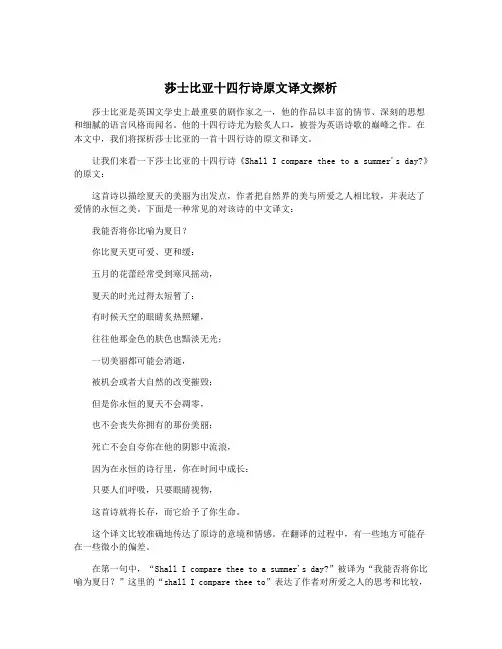
莎士比亚十四行诗原文译文探析莎士比亚是英国文学史上最重要的剧作家之一,他的作品以丰富的情节、深刻的思想和细腻的语言风格而闻名。
他的十四行诗尤为脍炙人口,被誉为英语诗歌的巅峰之作。
在本文中,我们将探析莎士比亚的一首十四行诗的原文和译文。
让我们来看一下莎士比亚的十四行诗《Shall I compare thee to a summer's day?》的原文:这首诗以描绘夏天的美丽为出发点,作者把自然界的美与所爱之人相比较,并表达了爱情的永恒之美。
下面是一种常见的对该诗的中文译文:我能否将你比喻为夏日?你比夏天更可爱、更和缓:五月的花蕾经常受到寒风摇动,夏天的时光过得太短暂了:有时候天空的眼睛炙热照耀,往往他那金色的肤色也黯淡无光;一切美丽都可能会消逝,被机会或者大自然的改变摧毁;但是你永恒的夏天不会凋零,也不会丧失你拥有的那份美丽;死亡不会自夸你在他的阴影中流浪,因为在永恒的诗行里,你在时间中成长:只要人们呼吸,只要眼睛视物,这首诗就将长存,而它给予了你生命。
这个译文比较准确地传达了原诗的意境和情感。
在翻译的过程中,有一些地方可能存在一些微小的偏差。
在第一句中,“Shall I compare thee to a summer's day?”被译为“我能否将你比喻为夏日?”这里的“shall I compare thee to”表达了作者对所爱之人的思考和比较,而“可以将你比喻为”则表达的是一种询问和请求的语气。
译文中的表达方式稍微有些软弱,不太能够传达原文中的自信和自豪之情。
在第二句中,“Thou art more lovely and more temperate”被译为“你比夏天更可爱、更和缓”,这里的“art”是表示存在的动词,应该译为“是”,而不是“比”。
译文中的表达方式稍微有些不准确。
虽然这个译文能够大体上传达原文的意境和情感,但在一些细节的表达上存在一些微小的偏差。
在翻译莎士比亚的十四行诗时,我们应该更加注重原文的语言风格和情感表达,努力做到准确传达原文的意思。
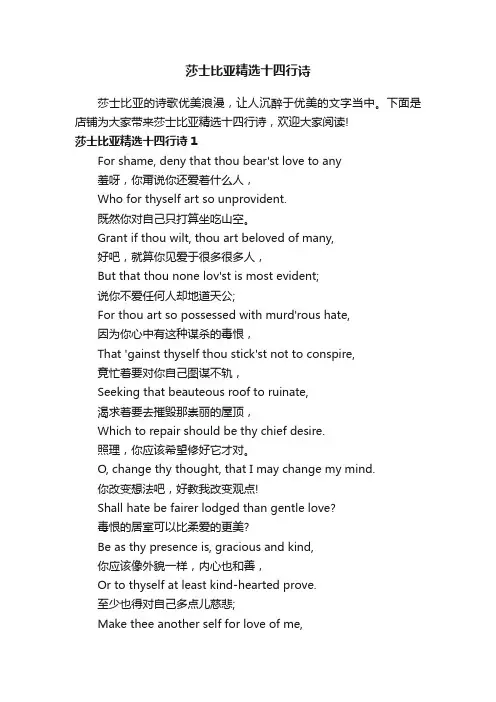
莎士比亚精选十四行诗莎士比亚的诗歌优美浪漫,让人沉醉于优美的文字当中。
下面是店铺为大家带来莎士比亚精选十四行诗,欢迎大家阅读!莎士比亚精选十四行诗1For shame, deny that thou bear'st love to any羞呀,你甭说你还爱着什么人,Who for thyself art so unprovident.既然你对自己只打算坐吃山空。
Grant if thou wilt, thou art beloved of many,好吧,就算你见爱于很多很多人,But that thou none lov'st is most evident;说你不爱任何人却地道天公;For thou art so possessed with murd'rous hate,因为你心中有这种谋杀的毒恨,That 'gainst thyself thou stick'st not to conspire,竟忙着要对你自己图谋不轨,Seeking that beauteous roof to ruinate,渴求着要去摧毁那崇丽的屋顶,Which to repair should be thy chief desire.照理,你应该希望修好它才对。
O, change thy thought, that I may change my mind.你改变想法吧,好教我改变观点!Shall hate be fairer lodged than gentle love?毒恨的居室可以比柔爱的更美?Be as thy presence is, gracious and kind,你应该像外貌一样,内心也和善,Or to thyself at least kind-hearted prove.至少也得对自己多点儿慈悲;Make thee another self for love of me,你爱我,就该去做另一个自身,That beauty still may live in thine or thee.使美在你或你后代身上永存。
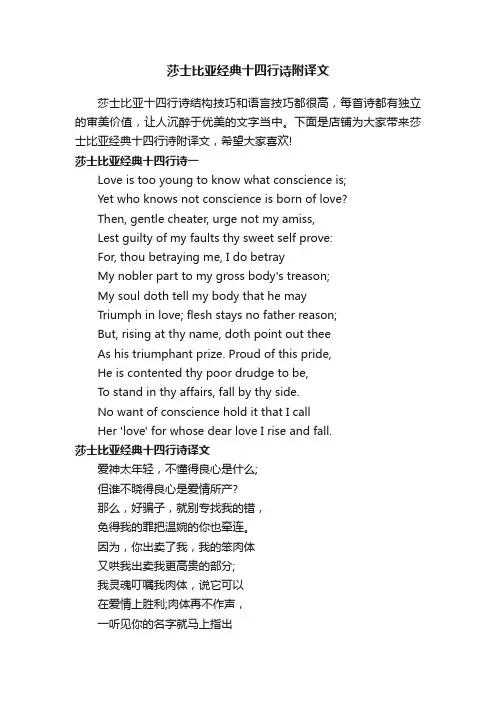
莎士比亚经典十四行诗附译文莎士比亚十四行诗结构技巧和语言技巧都很高,每首诗都有独立的审美价值,让人沉醉于优美的文字当中。
下面是店铺为大家带来莎士比亚经典十四行诗附译文,希望大家喜欢!莎士比亚经典十四行诗一Love is too young to know what conscience is;Yet who knows not conscience is born of love?Then, gentle cheater, urge not my amiss,Lest guilty of my faults thy sweet self prove:For, thou betraying me, I do betrayMy nobler part to my gross body's treason;My soul doth tell my body that he mayTriumph in love; flesh stays no father reason;But, rising at thy name, doth point out theeAs his triumphant prize. Proud of this pride,He is contented thy poor drudge to be,To stand in thy affairs, fall by thy side.No want of conscience hold it that I callHer 'love' for whose dear love I rise and fall.莎士比亚经典十四行诗译文爱神太年轻,不懂得良心是什么;但谁不晓得良心是爱情所产?那么,好骗子,就别专找我的错,免得我的罪把温婉的你也牵连。
因为,你出卖了我,我的笨肉体又哄我出卖我更高贵的部分;我灵魂叮嘱我肉体,说它可以在爱情上胜利;肉体再不作声,一听见你的名字就马上指出你是它的胜利品;它趾高气扬,死心蹋地作你最鄙贱的家奴,任你颐指气使,或倒在你身旁。
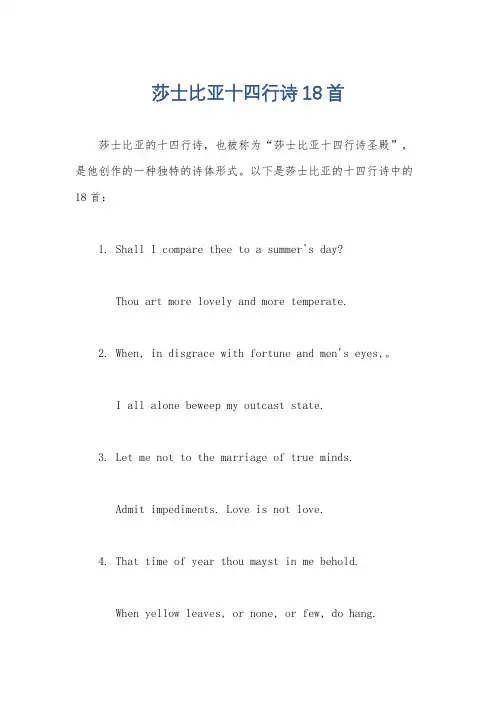
莎士比亚十四行诗18首莎士比亚的十四行诗,也被称为“莎士比亚十四行诗圣殿”,是他创作的一种独特的诗体形式。
以下是莎士比亚的十四行诗中的18首:1. Shall I compare thee to a summer's day?Thou art more lovely and more temperate.2. When, in disgrace with fortune and men's eyes,。
I all alone beweep my outcast state.3. Let me not to the marriage of true minds.Admit impediments. Love is not love.4. That time of year thou mayst in me behold.When yellow leaves, or none, or few, do hang.5. My mistress' eyes are nothing like the sun;Coral is far more red than her lips' red.6. When my love swears that she is made of truth,。
I do believe her, though I know she lies.7. When to the sessions of sweet silent thought.I summon up remembrance of things past.8. From fairest creatures we desire increase,。
That thereby beauty's rose might never die.9. O thou, my lovely boy, who in thy power.Dost hold Time's fickle glass, his sickle, hour.10. That you were once unkind befriends me now,。
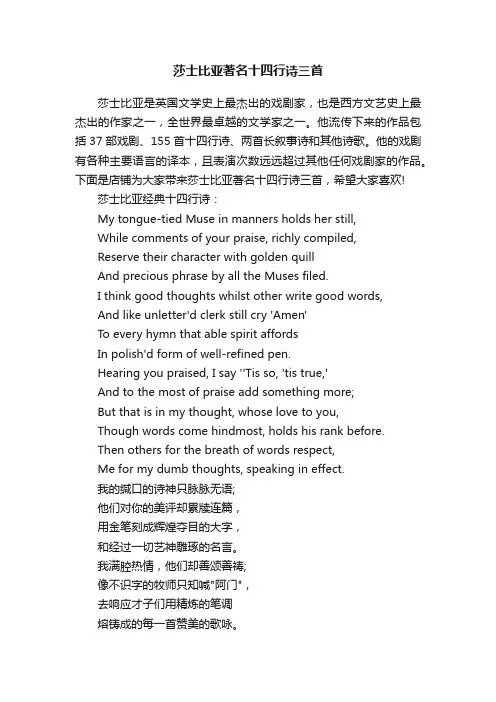
莎士比亚著名十四行诗三首莎士比亚是英国文学史上最杰出的戏剧家,也是西方文艺史上最杰出的作家之一,全世界最卓越的文学家之一。
他流传下来的作品包括37部戏剧、155首十四行诗、两首长叙事诗和其他诗歌。
他的戏剧有各种主要语言的译本,且表演次数远远超过其他任何戏剧家的作品。
下面是店铺为大家带来莎士比亚著名十四行诗三首,希望大家喜欢!莎士比亚经典十四行诗:My tongue-tied Muse in manners holds her still,While comments of your praise, richly compiled,Reserve their character with golden quillAnd precious phrase by all the Muses filed.I think good thoughts whilst other write good words,And like unletter'd clerk still cry 'Amen'To every hymn that able spirit affordsIn polish'd form of well-refined pen.Hearing you praised, I say ''Tis so, 'tis true,'And to the most of praise add something more;But that is in my thought, whose love to you,Though words come hindmost, holds his rank before.Then others for the breath of words respect,Me for my dumb thoughts, speaking in effect.我的缄口的诗神只脉脉无语;他们对你的美评却累牍连篇,用金笔刻成辉煌夺目的大字,和经过一切艺神雕琢的名言。
莎士比亚十四行诗莎士比亚是英国文学史上最杰出的戏剧家,也是西方文艺史上最杰出的作家之一,全世界最卓越的文学家之一。
他流传下来的作品包括37部戏剧、155首十四行诗、两首长叙事诗和其他诗歌。
他的戏剧有各种主要语言的译本,且表演次数远远超过其他任何戏剧家的作品。
下面是店铺为大家带来莎士比亚十四行诗,希望大家喜欢!莎士比亚十四行诗:Or whether doth my mind, being crown'd with you,Drink up the monarch's plague, this flattery?Or whether shall I say, mine eye saith true,And that your love taught it this alchemy,To make of monsters and things indigestSuch cherubins as your sweet self resemble,Creating every bad a perfect best,As fast as objects to his beams assemble?O,'tis the first; 'tis flattery in my seeing,And my great mind most kingly drinks it up:Mine eye well knows what with his gust is 'greeing,And to his palate doth prepare the cup:If it be poison'd, 'tis the lesser sinThat mine eye loves it and doth first begin.是否我的心,既把你当王冠戴,喝过帝王们的鸩毒--自我阿谀?还是我该说,我眼睛说的全对,因为你的爱教会它这炼金术,使它能够把一切蛇神和牛鬼转化为和你一样柔媚的天婴,把每个丑恶改造成尽善尽美,只要事物在它的柔辉下现形?哦,是前者;是眼睛的自我陶醉,我伟大的心灵把它一口喝尽:眼睛晓得投合我心灵的口味,为它准备好这杯可口的毒饮。
莎士比亚十四行诗原文译文探析莎士比亚(William Shakespeare)是英国文学史上的一位伟大的戏剧家和诗人,他的作品流传于世并对后世文学产生了深远的影响。
莎士比亚的十四行诗是他众多杰作中的一部分,他以其深刻的思想和优美的诗句赢得了世人的赞誉。
在这篇文章中,我们将对莎士比亚的十四行诗进行原文、译文以及探析。
我们先来看一首莎士比亚的十四行诗原文:Sonnet 18接下来是这首诗的译文:第18首十四行诗我是否应该把你比作夏日?你比夏日更可爱更温和:狂风摇曳着五月娇艳的花蕾,夏日的期限太短暂了:太阳有时候照得太热烈,有时候他那金色的容颜也黯淡无光;天生的美丽有时会减退,不管是偶然或是自然的变化所致;但是你那永恒的夏天绝不会褪色,也不会失去你拥有的那份美丽;死亡也不能夸耀说你属于他的阴影,当你那永恒的形象随时间而增长;只要有人们的呼吸或者眼睛还能看到,这首诗就将长存,这首诗给了你生命。
莎士比亚的十四行诗常常采用押韵的手法,并且以iambic pentameter的形式出现。
这首Sonnet 18即为莎士比亚的经典之作,通过比喻把描绘出了诗人对爱人的赞美之情。
诗的开篇即以修辞设问来呈现,作者在问自己是否应该将心上人比作夏日,然后通过下文的赞美,表达出对心上人更为深切的赞美之情。
他认为心上人的美丽胜过夏日,夏日虽然美丽,却不如心上人温和可爱。
由此,诗中呈现了作者对心上人的赞美之情。
在诗的后半部分,诗人使用了“永恒的夏天”来包含对心上人的赞美之语,不管是风吹雨打,都不会改变。
随后,诗人再以修辞手法呼唤死亡无法摧毁对心上人的赞美之情,并肯定了这份美丽将长存与时间,给了心上人永生。
通过以上对原文和译文的对比分析,我们不难发现莎士比亚的十四行诗所蕴含的深刻情感。
诗人通过对夏日和心上人的比较,抒发了对心上人深切的赞美之情,并以永恒的夏天来喻示继续深切的情感长存。
这首诗也正是莎士比亚情感抒发的一个缩影,其深情款款的语言和艺术手法让我们感受到了莎士比亚伟大的文学魅力。
莎士比亚的十四行诗是一组优美的抒情诗,共154 首,创作于1592 年至1598 年之间。
这些诗歌以爱情、友谊、时间和人生为主题,表达了诗人对生活的思考和感悟。
以下是一些精选的莎士比亚十四行诗:
1. "Sonnet 18"(第十八首十四行诗):这首诗被认为是莎士比亚十四行诗中最著名的一首,它以生动的比喻和优美的语言赞美了爱人的美丽,表达了诗人对爱情的永恒追求。
2. "Sonnet 116"(第一百一十六首十四行诗):这首诗探讨了爱情的真实和坚定,诗人认为真正的爱情不会因为时间、变化或逆境而动摇。
3. "Sonnet 29"(第二十九首十四行诗):这首诗表达了诗人在面对人生困境时的自我反思和对未来的希望。
4. "Sonnet 73"(第七十三首十四行诗):这首诗以人生的衰老和时间的流逝为主题,表达了诗人对时光荏苒的感慨和对生命的思考。
莎士比亚的十四行诗以其优美的语言、深刻的思想和情感表达而著称,对后世的诗歌创作产生了深远的影响。
这些诗歌不仅展示了诗人的文学才华,也反映了他对人生、爱情和友谊的独特见解。
精选莎士比亚十四行诗莎士比亚的诗歌优美浪漫,让人沉醉于优美的文字当中。
下面是店铺为大家带来精选莎士比亚十四行诗,欢迎大家阅读!精选莎士比亚十四行诗1Music to hear, why hear'st thou music sadly?你是音乐,为什么悲哀地听音乐?Sweets with sweets war not, joy delights in joy.甜蜜不忌甜蜜,欢笑爱欢笑。
Why lov'st thou that which thou receiv'st not gladly,为什么你不愉快地接受喜悦?Or else receiv'st with pleasure thine annoy?要不然,你就高兴地接受苦恼?If the true concord of well tuned sounds,假如几种入调的声音合起来By unions married, do offend thine ear,成了真和谐,教你听了不乐,They do but sweetly chide thee, who confounds那它只是美妙地责备你不该In singleness the parts that thou shouldst bear.守独身而把你应守的本分推脱。
Mark how one string, sweet husband to another,听一根弦儿,另一根的好丈夫,听,Strikes each in each by mutual ordering;一根拨响了一根应,琴音谐和;Resembling sire, and child, and happy mother,正如父亲、儿子和快乐的母亲,Who all in one, one pleasing note do sing;合成一体,唱一支动听的歌:Whose speechless song, being many, seeming one,他们那没词儿的歌,都异口同声,Sings this to thee, 'Thou single wilt prove none.' 对你唱:“你独身,将要一事无成。
莎士比亚十四行诗原文译文探析莎士比亚(William Shakespeare)是英国文学史上最杰出的剧作家和诗人之一,他的作品被翻译成多种语言,并在全球范围内广泛传播。
莎士比亚的十四行诗(Sonnet)尤为著名,这些诗歌以其深刻的情感、优美的语言和细腻的描写而闻名于世。
本文将对莎士比亚的十四行诗原文进行解析,并对其进行中文翻译,以探讨其诗歌魅力及特点。
我们可以以莎士比亚的第18首十四行诗为例,来进行原文分析和翻译。
翻译:我将你比作夏日吗?你比夏日更可爱温柔:大风摇曳着五月的娇蕾,夏日的时光太短促:有时天上的眼睛闷热骄阳,金色的脸庞也会变得阴霾;一切美丽都要有凋零的时刻,不论是偶然或是自然的更迭;但你永恒的夏日不会凋零,也不会失去你所拥有的美丽;死亡也不会得意你在他阴影下徘徊,当你在永恒的诗行中与时间一同成长:只要人类还能呼吸,眼睛还能看到,这首诗就会活着,而这诗为你赋予永生。
在这首诗中,莎士比亚通过比喻的手法将爱情赋予了永恒的生命力,表达了对爱情的赞美和珍视。
诗中描述了夏日的短暂和变化,与之相比,诗人认为所爱的人之美将永存不朽,不受时间和死亡的摧残。
莎士比亚用极其婉转的语言,表达了对所爱之人深切的感情和艳丽的赞美。
诗中对时间的描绘和爱情的延续也是莎士比亚十四行诗的常见主题。
莎士比亚的十四行诗在原文中运用了丰富的修辞手法,包括比喻、排比、转折等,使诗歌语言优美、精练,并能够深刻表达其情感。
莎士比亚对押韵和韵脚的运用也非常出色,使得诗歌在朗诵时具有优美的韵律感,增强了诗歌的感染力和表现力。
对于翻译而言,莎士比亚的十四行诗的翻译可以说是一项极具挑战性的任务。
翻译者需要理解莎士比亚的原文意境和表达方式,将其准确地传达到目标语言中去。
在保持原文风格和韵律的基础上,翻译者还需尽量使译文通顺、自然,表达出原文的情感和内涵。
莎士比亚的十四行诗翻译对于翻译者的语言功底和文学素养都有较高的要求。
莎士比亚的十四行诗中常常运用反讽、夸张等修辞手法,这些手法使诗歌在表达情感时更显得生动、深刻。
莎士比亚的第十八首十四行诗莎士比亚的第18首十四行诗是他的一首著名Sonnet(十四行诗),以下是该诗的原文:Shall I compare thee to a summer's day? Thou art more lovely and more temperate: Rough winds do shake the darling buds of May, And summer's lease hath all too short a date: Sometime too hot the eye of heaven shines, And often is his gold complexion dimmed; And every fair from fair sometime declines, By chance or nature's changing course untrimmed; But thy eternal summer shall not fade Nor lose possession of that fair thou owest; Nor shall Death brag thou wanderest in his shade, When in eternal lines to time thou growest: So long as men can breathe or eyes can see, So long lives this, and this gives life to thee.这首诗是一首表达爱情赞美的十四行诗,诗人将心爱之人与夏日做了比较,认为她比夏天更加美丽和温和,不会随着时间的流逝而变淡,也不会被死亡所征服,因为她将永远存在于这首诗中。
这首诗以其深情而著名,被广泛阅读和欣赏。
1From fairest creatures we desire increase,That thereby beauty’s rose might never die,But as the riper should by time deceaseHis tender heir might bear his memory.But thou, contracted to thine own bright eyes, Feed’st thy light’s flame with self-substantial fuel, Making a famine where abundance lies,Thyself thy foe, to thy sweet self too cruel. Thou that art now the world’s fresh ornament And only herald to the gaudy spring,Within thine own bud buriest thy content,And, tender churl, mak’st waste in niggarding. Pity the world, or else this glutton be,To eat the world’s due, by the grave and thee.惟愿佳丽多成行,美丽玫瑰不断秧,前辈寿终需正寝,娇嫩儿女继芬芳。
俊杰自恋太荒唐,迟迟不肯迎新娘。
富贵不思成家业,人人为君而悲伤。
百花丛中最鲜艳,君乃伦敦第一郎,天下女儿都思君,俊杰为何不大婚?别让花芯空枯萎,开花结果理应当,如把青春空挥霍,死后带入坟墓中2When forty winters shall besiege thy browAnd dig deep trenches in thy beauty’s field,Thy youth’s proud livery, so gazed on now,Will be a tattered weed, of small worth held. Then being asked where all thy beauty lies, Where all the treasure of thy lusty days,To say within thine own deep-sunken eyesWere an all-eating shame and thriftless praise. How much more praise deserved thy beauty’s use If thou couldst answer, “This fair child of mine Shall sum my count and make my old excuse,”Proving his beauty by succession thine.This were to be new made when thou art old, And see thy blood warm when thou feel’st it cold.2四十严冬攻额头,脸上皱纹如鸿沟,青春华服人人颂,老来变成烂布头。
如是有人问起你,当年青春在哪里?“在我深陷眼窝里,”如此回答真可耻。
“当年美貌传子孙,儿女养老又送终。
”青春如此来使用,世上无人不称颂。
不怕年老手足僵,儿女成长继芬芳。
3Look in thy glass and tell the face thou viewest, Now is the time that face should form another, Whose fresh repair if now thou not renewest,Thou dost beguile the world, unbless some mother. For where is she so fair whose uneared womb Disdains the tillage of thy husbandry?Or who is he so fond will be the tombOf his self-love, to stop posterity?Thou art thy mother’s glass, and she in thee Calls back the lovely April of her prime;So thou through windows of thine age shalt see, Despite of wrinkles, this thy golden time.But if thou live remembered not to be,Die single and thine image dies with thee.3快去照镜子,告诉镜中人,时刻已到来,再造镜中人。
英俊男青年,如不成大婚,世界将悲哀,减少一母亲。
多少美少女,渴望你爱情,盼你来播种,盼你来耕耘。
纯洁男青年,不要再分心,为何太自恋,断子又绝孙?你就是镜子,对于你母亲,母亲的青春,在你身影里,将来你衰老,你也将看到,自己的青春,儿女身影里。
如果你不愿,留下美孩儿,老来无人问,美貌葬孤坟。
4Unthrifty loveliness, why dost thou spend Upon thyself thy beauty’s legacy?Nature’s bequest gives nothing, but doth lend, And, being frank, she lends to those are free. Then, beauteous niggard, why dost thou abuse The bounteous largess given thee to give? Profitless usurer, why dost thou useSo great a sum of sums yet canst not live?For having traffic with thyself alone,Thou of thyself thy sweet self dost deceive. Then how when nature calls thee to be gone, What acceptable audit canst thou leave? Thy unused beauty must be tombed with thee, Which usèd lives th' executor to be.4风流倜傥美青年,不要整天来游玩,天生丽质天赐你,让她流传到永远。
青年朋友别犹豫,坚持独身有何益,别做愚蠢守财奴,腰缠万贯饿肚皮。
青年迟迟不大婚,祖宗香火谁继承。
何不养育美孩儿,多子多福过一生。
青年若听我忠言,不怕死神来敲门,否则将来上西天,风流文采无处寻。
5Those hours that with gentle work did frame The lovely gaze where every eye doth dwell Will play the tyrants to the very sameAnd that unfair which fairly doth excel.For never-resting time leads summer onTo hideous winter and confounds him there,Sap checked with frost and lusty leaves quite gone, Beauty o'er-snowed and bareness everywhere. Then were not summer’s distillation left,A liquid prisoner pent in walls of glass, Beauty’s effect with beauty were bereft,Nor it nor no remembrance what it was.But flowers distilled, though they with winter meet, Lose but their show; their substance still lives sweet.时间铸造美容颜,贩夫走卒齐惊叹,将来还要施暴戾,使你丑陋人人嫌。
无情时间将夏天,拖到冬天来摧残,树脂结冰枝叶枯,美丽埋葬在荒原。
如不及时把玫瑰,炼成香水藏瓶内,将来花儿枯萎时,一缕清香无处寻。
提炼的花儿得永生,永留芬芳在人间。
6Then let not winter’s ragged hand defaceIn thee thy summer, ere thou be distilled.Make sweet some vial; treasure thou some place With beauty’s treasure, ere it be self-killed.That use is not forbidden usuryWhich happies those that pay the willing loan; That’s for thyself to breed another thee,Or ten times happier, be it ten for one.Ten times thyself were happier than thou art,If ten of thine ten times refigured thee.Then what could death do if thou shouldst depart, Leaving thee living in posterity?Be not self-willed, for thou art much too fairTo be death’s conquest and make worms thine heir.6别让冬天佝偻手,夺走你的娇丽颜,人生精华需珍惜,生儿育女莫迟疑。
这不是放高利贷,还钱的人多愉快,是要你再生一个你,生得越多越痛快。
生出十个都像你,你的幸福增十倍,活在后代身影里,死神拿你也无奈。
好朋友,别拖延,不要让蛆虫,做你继承人。